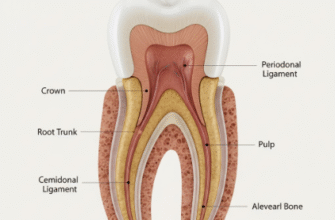Ever catch your reflection when you’re genuinely happy? That flash of teeth, the crinkle around your eyes – it’s more than just a facial expression. It’s a powerful signal, both to the world and, perhaps more importantly, back to yourself. The simple act of smiling holds a surprising amount of sway over how we feel about ourselves, our capabilities, and our place in the world. It’s a subtle yet potent tool in building and projecting self-confidence.
The Unseen Mechanics of a Grin
When you smile, even if you’re initially faking it, your brain gets a little nudge. Facial muscles contract in a specific way, and this movement sends signals to your neural pathways. Think of it as a biofeedback loop. This can trigger the release of endorphins, those feel-good neurotransmitters that act as natural mood lifters and stress relievers. So, that smile isn’t just an outward display; it’s an internal mood adjuster. When you feel a bit better, a bit lighter, your confidence naturally gets a little boost. It’s like your body is telling your mind, “Hey, things are pretty good,” and your mind starts to believe it.
This isn’t just wishful thinking. Numerous studies have explored the “facial feedback hypothesis,” which suggests that our facial expressions can influence our emotional experience. So, by consciously choosing to smile, you’re essentially giving yourself a micro-dose of positivity, which can chip away at feelings of self-doubt and insecurity. It’s a fascinating interplay between body and mind, where a simple physical action can have profound psychological benefits.
The Social Mirror: How Others See Your Smile
Our smiles don’t exist in a vacuum. They are a fundamental part of how we communicate and connect with others. A genuine smile is often perceived as a sign of warmth, approachability, and openness. When you offer a smile, people are more likely to respond positively to you. They might smile back, engage in conversation more readily, or simply feel more comfortable in your presence. This positive social feedback is a powerful reinforcer of self-confidence.
Imagine walking into a room full of strangers. If you’re wearing a frown or a neutral expression, you might feel invisible or even a bit intimidated. But if you enter with a gentle, confident smile, you’re more likely to make eye contact, receive nods of acknowledgement, and generally feel more accepted. Each positive micro-interaction builds upon the last, reinforcing the belief that you are a likable and welcome presence. This isn’t about being the loudest person in the room; it’s about the quiet power of a positive facial expression creating an inviting atmosphere around you.
The Ripple Effect on Interactions
When you feel more confident because you’re smiling and receiving positive feedback, this impacts the quality of your interactions. You might find yourself speaking more clearly, contributing ideas more freely, or even handling disagreements with greater poise. Your smile can act as a social lubricant, making negotiations smoother and collaborations more fruitful. It’s a non-verbal cue that says, “I’m friendly, I’m confident, and I’m open to positive engagement.” This can be particularly beneficial in professional settings, social gatherings, or even everyday encounters like ordering coffee or asking for directions. The warmth conveyed can often disarm tension and encourage cooperation.
Scientific research supports the idea that smiling, even when initially forced, can trick your brain into feeling happier. This phenomenon, known as the facial feedback hypothesis, suggests that the physical act of smiling can stimulate the release of endorphins. These natural mood boosters can, in turn, enhance feelings of well-being and self-assurance, creating a positive upward spiral.
Smiling Through the Nerves
Let’s be honest, there are times when smiling feels like the last thing we want to do. Maybe you’re nervous before a presentation, anxious about a first date, or just having a rough day. It might seem counterintuitive, but this is precisely when a smile can be a surprisingly effective tool. The “fake it ’til you make it” approach can actually work here. By consciously putting on a smile, even a small one, you can begin to shift your internal state.
It’s not about denying your feelings of nervousness or anxiety. It’s about using a physical action to influence your emotional and psychological state. The act of smiling can help to regulate your breathing, lower your heart rate slightly, and send those calming signals to your brain we talked about earlier. This can create a small pocket of calm, giving you the mental space to manage your nerves and approach the situation with a bit more self-assuredness. Think of it as arming yourself with a simple, accessible tool to navigate challenging moments, allowing your inner strength to surface.
Practice Makes Progress
If smiling doesn’t come naturally to you, especially when you’re feeling less than confident, it’s okay. Like any skill, it can be cultivated. You might try practicing in front of a mirror – not to judge yourself, but to simply get used to the feeling and appearance of your own smile. Notice how it changes your facial features and even how it makes you feel internally. You could also make a conscious effort to smile at people you encounter throughout your day – the barista, a colleague, or even a stranger on the street (where culturally appropriate, of course). These small acts can gradually make smiling feel more natural and less like a performance, integrating it into your authentic expression.
When Your Smile Feels Like a Barrier
It’s important to acknowledge that for some, their smile can be a source of self-consciousness rather than confidence. Concerns about dental aesthetics – perhaps crooked teeth, discoloration, or other perceived imperfections – can make someone hesitant to smile freely. This reluctance can, unfortunately, create a cycle where a lack of smiling leads to fewer positive social interactions, which can then further erode self-confidence. The very thing that could boost their confidence becomes something they try to hide, impacting their willingness to engage openly.
If this resonates with you, know that you’re not alone. Many people experience these feelings. While it’s crucial to remember that true confidence comes from within and isn’t solely dependent on physical appearance, addressing aspects of your appearance that cause significant distress can sometimes be a step towards feeling better. For those particularly bothered by their dental appearance, options exist, but the most important first step is cultivating self-acceptance. A genuine smile, regardless of perceived “perfection,” carries immense power. However, if concerns about your smile are genuinely holding you back from expressing joy and connecting with others, exploring solutions with a dental professional could be a path to consider for your own comfort and confidence, not for external validation.
While enhancing your smile for personal confidence is a valid choice for some, remember that authentic self-worth isn’t solely tied to physical appearance. True confidence blossoms from self-acceptance and recognizing your inherent value. Focus on holistic well-being rather than seeking external validation through perceived perfection, as genuine happiness radiates from within.
The Radiating Power of a Confident Smile
A smile born from genuine self-confidence, or even one that helps build that confidence, has a radiating effect. It’s not just about how you feel in the moment; it’s about how you move through the world. When you smile more, you tend to exude a more positive and approachable energy. This can open doors, create opportunities, and foster stronger relationships. People are naturally drawn to those who seem comfortable and happy in their own skin, and a smile is often the first indicator of this inner state.
Think about someone you admire for their confidence. Chances are, they smile easily and genuinely. Their smile is an extension of their inner state, a signal that they are secure and content. This doesn’t mean they don’t have bad days or moments of doubt, but their default tends to lean towards a positive outward expression. By harnessing the power of your own smile, you can begin to cultivate a similar presence. It’s a journey, not a destination, and each smile is a step in the right direction toward feeling more assured and positive in your daily life.
Ultimately, your smile is a unique part of who you are. It’s a reflection of your joy, your warmth, and your inner strength. Embracing it, sharing it, and allowing it to boost your self-confidence is a gift you can give yourself every single day. It costs nothing, yet its value is immeasurable. So, let your smile shine – for yourself, and for the world around you. You might be surprised at the positive changes it brings, not just in how others perceive you, but more importantly, in how you perceive yourself.








